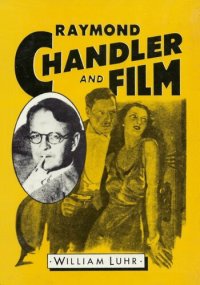
Ebook: Raymond Chandler and Film
Author: William Luhr
- Genre: Art // Cinema
- Series: Ungar Film Library
- Year: 1982
- Publisher: Frederick Ungar
- City: New York
- Edition: 1
- Language: English
- pdf
When in 1943, Chandler first entered Bill Wilder's office to begin collaboration on the script for 'Double Indemnity' (1944), he knew little about the film industry and less about screenwriting. His first draft was literally hurled back at him: "This is s..., Mr. Chandler." He began again. The final script was nominated for an Academy Award.
Success came quickly to Chandler, Though during his turbulent years in Hollywood he was to receive screen credit for only five films - among them 'The Blue Dahlia' (1946) and 'Strangers on a Train' (1951). His screenplays, his fiction, and the films based on that fiction rapidly became associated with a style that French critics were to baptize 'film noir'. Before the Forties were over, there were six films based upon his novels and they included such now recognized classics as Edward Dmytryk's 'Murder, My Sweet' (1944), Howard Hawks's 'The Big Sleep' (1946) - scripted in part by William Faulkner - and Robert Montgomery's 'Lady in the Lake' (1947).
In the years that followed, new filmmakers were drawn to Chandler's seven novels as source material. Now in the Eighties it seems likely that we will see new screen reinterpretations of Chandler's special and instantly recognizable world. Beginning with an overview of the period in which Chandler rose to prominence, this lively study goes on to chronicle his frequently his frequently stormy career as a screenwriter and then examines in detail the films based on his fiction. Important in themselves, they helped break the grip on the censors and led to a new type of movie that continues to bear Chandler's stamp more than twenty years after his death.
Success came quickly to Chandler, Though during his turbulent years in Hollywood he was to receive screen credit for only five films - among them 'The Blue Dahlia' (1946) and 'Strangers on a Train' (1951). His screenplays, his fiction, and the films based on that fiction rapidly became associated with a style that French critics were to baptize 'film noir'. Before the Forties were over, there were six films based upon his novels and they included such now recognized classics as Edward Dmytryk's 'Murder, My Sweet' (1944), Howard Hawks's 'The Big Sleep' (1946) - scripted in part by William Faulkner - and Robert Montgomery's 'Lady in the Lake' (1947).
In the years that followed, new filmmakers were drawn to Chandler's seven novels as source material. Now in the Eighties it seems likely that we will see new screen reinterpretations of Chandler's special and instantly recognizable world. Beginning with an overview of the period in which Chandler rose to prominence, this lively study goes on to chronicle his frequently his frequently stormy career as a screenwriter and then examines in detail the films based on his fiction. Important in themselves, they helped break the grip on the censors and led to a new type of movie that continues to bear Chandler's stamp more than twenty years after his death.
Download the book Raymond Chandler and Film for free or read online
Continue reading on any device:

Last viewed books
Related books
{related-news}
Comments (0)